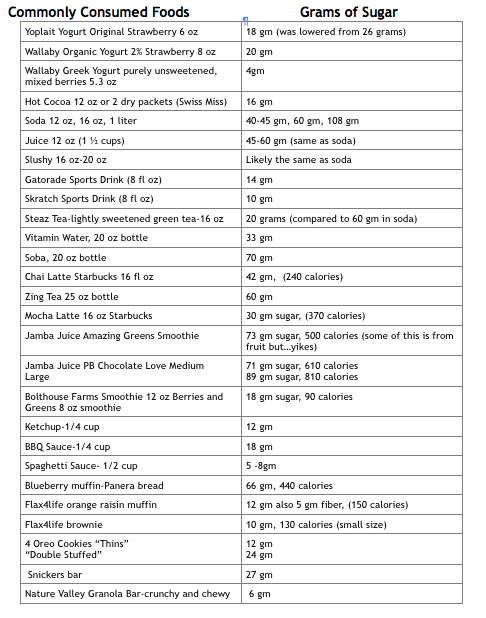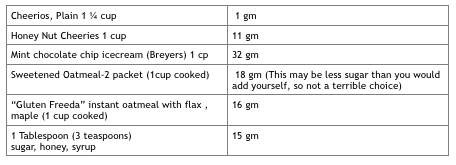Sugar: Do You Have A True Addiction or Are You Just Not Eating Healthy Meals?
Photo credit: Sharon McCutcheon
Most Americans have gotten the message that eating too much sugar is not good for our health. But how you go about cutting down on sugar is an important issue to consider. Do you treat it like a true addiction and go cold turkey, or do you use a more rationalized, nuanced approach so it is far less appealing to you? Maybe the answer is somewhere in between.
WHY IS EXCESSIVE SUGAR A PROBLEM?
Excessive sugar intake is associated with anxiety, depression, decreased cognitive function (1), and may lead to a higher risk of fatty liver, inflammation, oxidative stress, diabetes, obesity, heart disease and cancer. There are a few biological-based theories for why people over consume sugar, but these are not the same reasons as the physical dependency that is caused by drugs or alcohol. Applying the addiction techniques of abstinence that we use for drug and alcohol addiction may backfire for people dealing with eating issues. There are tried and true techniques for helping people stop overeating on sugar that don’t involve abstinence.
Overeating on highly palatable foods (high in sugar/fat) is often a learned response to manage uncomfortable feelings from hormones such as cortisol and adrenaline, that are released when we are experiencing anxiety or stress (1). These hormones are released in the body from the activation of the hypothalamus, pituitary, adrenal axis (HPA) in order to help you flee a stressful, or dangerous situation. When you can’t run away, consumption of sugar has been shown to reduce cortisol and calm down the HPA axis (1).
To discuss sugar addiction, schedule a 15 minute chat here
WHY WE FEEL GOOD, IN THE SHORT TERM
Eating highly refined carbohydrate foods (like white flour and sugar) causes a temporary boost in a neurotransmitter called serotonin that can make you feel happy and more relaxed. This calming effect from boosting serotonin and quieting cortisol and adrenaline is only temporary, and the release of stress chemicals will come right back up, and serotonin will drop, thus perpetuating the drive to self soothe by eating more sugar (1). Additionally, any highly palatable food that you eat on a regular basis, that is associated with comfort, happy feelings or happy memories, may result in creating neuropathways to prefer this food (neuroplasticity) and can make you prone to overeating this food (1). The good news is that you can “retrain your brain” and create new neuropathways to prefer healthy foods and beverages.
Another factor with overconsuming highly palatable foods is that some people may not produce enough dopamine. Dopamine is the neurotransmitter that helps you experience motivation, focus, organization, pleasure, and control of your impulses around tempting foods. If you don’t produce enough dopamine it can be very challenging to control the consumption of highly palatable foods. There are key nutrients that can be very helpful in boosting your ability to produce more dopamine and experience less of a problem with craving sugary foods.
WHAT SHOULD YOU DO?
What is the next step if you feel like you are overconsuming sugar and want to change this pattern? How do you learn to live with the ever-presence of sugar, and reasonably consume a controlled amount of sugar so you don’t develop health problems or have it trigger out of control eating for weeks or months?
For starters, I would be careful about labeling yourself as someone who is addicted to sugar and maybe do some investigation into your overall food patterns as there might be an easy fix. When people use an addiction label in regard to food, they can become so worried and obsessed that they start feeling guilty about everything they eat, which can trigger binging. People who try to go weeks without even a tiny amount of sugar often end up having sugar binges and can get locked into a vicious cycle for months.
In reality, most people who eat a lot of sugar are doing so because they just don’t follow a normal, healthy meal pattern. They might skip meals, snack all day instead of putting their food on a plate and eating a conscious meal, or make every meal a perfect diet meal so they end up psychologically and physically underfeeding themselves. If people have spent most of the day in an anxious state, not having eaten a balanced breakfast and lunch, then by about 3 pm, their cortisol is very high, and biology kicks in and triggers a full-on sugar and food binge. This is almost impossible to avoid. The next morning they may feel guilty, so they don’t eat enough food again, and this cycle repeats itself the next day.
Here is a suggestion for you. Starting tomorrow, eat a healthy balanced breakfast, lunch, afternoon snack and dinner. (This can be done in a time restricted eating window if you are currently following that research). Choose healthy foods that don’t contain sugar, but don’t freak out about small issues, like if you can’t stand eating plain yogurt or you really want ketchup with your food. Add a little raw unfiltered honey to your yogurt and a squirt of ketchup on your food. Make some switches in your food choices to cut down on sugar (see the chart at the end of this article).
For many people, using a commonsense, “normal” approach to eating meals, as opposed to extreme restriction of foods, will help sugar lose its appeal. You don’t have to eat large meals that would cause weight gain. If you are uncertain about what portion sizes are appropriate for you, then it is worth it to enlist the help of a professional. I do suggest keeping sugary foods out of your home, but this won’t stop you from encountering sugar at your work vending machine, the grocery store, or your favorite coffee shop. Eating normal meals will help to stop the pattern of overeating on sugar.
WHAT IF THIS SUGGESTION DOESN’T HELP?
What if this suggestion doesn’t fix it? Then, you may be dealing with extreme stress or an underproduction of key neurotransmitters which is keeping you in a state of anxiety, and suffering with poor impulse control, fatigue, and depression that needs to be dealt with in general. You also may be avoiding distressing emotions by numbing out on food—this is when working with a psychotherapist can add a helpful element.
If you are dealing with an out of balance biochemistry, functional nutrition can make a huge impact on your brain chemistry and neurotransmitter production. A dietitian trained in integrative/functional nutrition can give you a structured nutrition program that helps your body produce feel good neurotransmitters, like serotonin and dopamine, that last all day long, so you don’t get a temporary boost followed by a huge drop, like what happens when you are eating sugar. I can also help you with targeted nutrient supplements and lifestyle changes to calm down your physiological response to stress and help to balance your brain chemistry.
There are practical things you can do such as scheduling relaxing or fun activities during the times you normally overeat on sugar, working at home less often (this can trigger overeating), and learning to organize your schedule so you have ENOUGH time to accomplish your goals instead of trying to cram too much into your day, which can trigger overeating.
If you have a goal of eating less sugar, it’s much easier to accomplish if you have a plan for success. Start by stocking up on healthy foods that are PREPARED AND READY TO EAT and clear sugary foods out of your kitchen. If you don’t have healthy food on hand that is already prepared to eat, you likely won’t eat it. See my blog post called “Don’t have time to cook?” about preparing healthy foods in advance so when you are hungry you have real food to eat.
SUMMARY
Last but not least, if you learn how to incorporate a reasonable amount of sugar into your healthy meal plan as opposed to trying to stop eating it altogether, you may find that you are much more successful in the long run. This concept is called flexible eating. If you feel that eating even a small amount of sugar is a trigger for you and sets off a streak of binging, this is a sign that professional help is needed.
If you would like a healthy, whole foods meal plan, designed to help you maintain a healthy weight and a healthy mood, feel free to reach out. Part of working with me includes teaching you how to eat flexibly and fit your favorite foods into a healthy diet.
Schedule a free 15 minute chat to discuss how nutrition can help you.
CHART OF SUGARY FOODS
Recommended Grams of Added Sugar Per Day:
24 grams for women (6 teaspoons) and 36 gm for men ( 9 tsp) (WHO) or 50 gm/2000 calories. Sugar may be listed on a food label as cane sugar, beet sugar, corn sugar, honey, syrup, sucrose, fructose, glucose, lactose, maltose.
*These statements have not been evaluated by the Food and Drug Administration. The products or dietary suggestions mentioned in this article are not intended to diagnose, treat, cure, or prevent any disease. The information in this article is not intended to replace any recommendations or relationship with your physician. Please review references sited at end of article for scientific support of any claims made.
References
The impact of sugar consumption on stress driven, emotional and addictive behaviors. https://www.sciencedirect.com/science/article/pii/S0149763418308613?via%3Dihub


